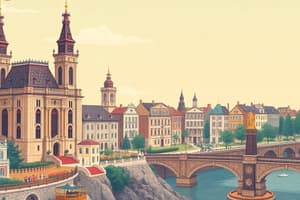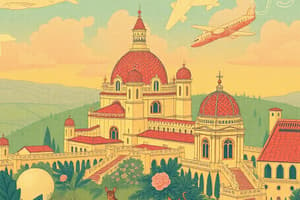Podcast
Questions and Answers
What is considered the primary reason for the existence of the tourism and hospitality industry?
What is considered the primary reason for the existence of the tourism and hospitality industry?
- Technological advancements
- Natural resources
- Built environment
- Tourists (correct)
Which category of stakeholders includes those who contribute to the demand for tourism products and services?
Which category of stakeholders includes those who contribute to the demand for tourism products and services?
- Tourists (correct)
- Suppliers
- Employees
- Government agencies
Which of the following is NOT a component affecting tourism according to the discussed content?
Which of the following is NOT a component affecting tourism according to the discussed content?
- Built environment
- Processes and systems
- Natural resources
- Transportation regulations (correct)
Which motivation is most commonly associated with tourists taking trips?
Which motivation is most commonly associated with tourists taking trips?
Which group is responsible for managing tourism-related enterprises, including airlines and hotels?
Which group is responsible for managing tourism-related enterprises, including airlines and hotels?
Which type of tourist classification is associated with geographical origin?
Which type of tourist classification is associated with geographical origin?
What is the expected trend for international tourist arrivals between 2010 and 2030 according to the UNWTO?
What is the expected trend for international tourist arrivals between 2010 and 2030 according to the UNWTO?
Which of the following stakeholders includes local owners of tourism enterprises?
Which of the following stakeholders includes local owners of tourism enterprises?
What is the primary role of tourism managers?
What is the primary role of tourism managers?
Which of the following is an example of a geophysical landscape attraction?
Which of the following is an example of a geophysical landscape attraction?
What are cultural historical attractions primarily composed of?
What are cultural historical attractions primarily composed of?
Which category does a spa fall under in the tourism sectors?
Which category does a spa fall under in the tourism sectors?
What is the primary purpose of special events as described?
What is the primary purpose of special events as described?
What distinguishes the second group of accommodations identified by Bhatia?
What distinguishes the second group of accommodations identified by Bhatia?
What type of ecological attraction can be observed in the Serengeti?
What type of ecological attraction can be observed in the Serengeti?
Which mode of transportation is NOT mentioned as part of the transport sector?
Which mode of transportation is NOT mentioned as part of the transport sector?
Which of the following is NOT a tourism sector?
Which of the following is NOT a tourism sector?
Who are considered intermediaries in the travel trade?
Who are considered intermediaries in the travel trade?
Which entities provide tourism support services?
Which entities provide tourism support services?
Which statement accurately describes the infrastructure in tourism?
Which statement accurately describes the infrastructure in tourism?
What is the role of ICT in tourism-related enterprises?
What is the role of ICT in tourism-related enterprises?
What are attractions that drive the influx of tourists primarily categorized into?
What are attractions that drive the influx of tourists primarily categorized into?
What is the key focus of transportation efficiency?
What is the key focus of transportation efficiency?
Which of the following is NOT considered a food and beverage service?
Which of the following is NOT considered a food and beverage service?
What defines an integrated resort?
What defines an integrated resort?
What aspect does ICT NOT include based on its definition?
What aspect does ICT NOT include based on its definition?
What does the acronym M.I.C.E. stand for in the context of business tourism?
What does the acronym M.I.C.E. stand for in the context of business tourism?
What is a component of the process and systems in tourism-related enterprises?
What is a component of the process and systems in tourism-related enterprises?
Which category includes attractions specifically designed for tourism?
Which category includes attractions specifically designed for tourism?
Which food service type is known for offering ethnic food and drinks?
Which food service type is known for offering ethnic food and drinks?
What is one of the significant economic benefits of the M.I.C.E industry?
What is one of the significant economic benefits of the M.I.C.E industry?
What type of event does NOT fall under special events?
What type of event does NOT fall under special events?
Flashcards are hidden until you start studying
Study Notes
Tourism Industry Sectors
- Tourists are the foundation of the tourism and hospitality industry.
- The industry comprises various sectors: accommodations, attractions, food and beverage services, gaming and entertainment, MICE (Meetings, Incentives, Conventions, and Exhibitions), special events, travel trade, and tourism support services.
Tourism Stakeholders
- Stakeholders are individuals, organizations, or communities that have an interest in the success of the tourism industry.
- Key stakeholders include tourists, employees, owners, property owners, government, civic society groups, NGOs, communities, suppliers, academic institutions, international organizations, indigenous groups, media, competitors, intermediaries, clients, and customers.
Tourist Motivations
- Tourists travel for various reasons, including relaxation, meeting friends and family, and experiencing different cultures.
- According to the UNWTO, international tourist arrivals are projected to increase by an average of 43 million per year between 2010 and 2030.
Tourism Environment
- The natural environment, encompassing climate, weather, and attractions, plays a significant role in attracting tourists.
- Natural environments can be classified into geophysical-landscape aesthetic (mountains, rivers, volcanoes) and ecological-biological (organisms and ecological processes, like the wildebeest migration in Serengeti).
- The built environment includes cultural-historical elements (artifacts, archaeological finds, churches, ancestral homes) and recreational facilities (museums, arenas, spas).
Accommodations
- Accommodations provide facilities for rest and relaxation, including hotels, resorts, villas, pension houses, and motels.
- Bhatia (2006) categorizes accommodations into two main segments: hotels and similar establishments (resorts, motels, inns) and supplementary accommodations (campgrounds, bed and breakfasts, hostels, resorts, condominiums, timeshare, and villas).
Attractions
- Attractions are the primary reason for visiting a destination and drive tourist influx.
- They are categorized into natural and man-made attractions.
- Man-made attractions are further divided into structures built for tourism and those originally built for other purposes.
- Examples include man-made buildings and structures designed for tourism, man-made buildings and structures not originally built for tourism, natural environments, and special events.
Food and Beverage Services
- Food and beverage services provide food and drinks to guests.
- Examples include restaurants, food stands, kiosks, food carts, cafeterias, canteens, bars, pubs, bakeshops, bakeries, specialty restaurants, vending machines.
Gaming and Entertainment
- Gaming and entertainment refers to casinos and integrated resorts (IRs).
- IRs are mixed-use properties that provide facilities for gaming, conventions, accommodations, shopping, and entertainment.
MICE (Meetings, Incentives, Conventions, and Exhibitions)
- MICE is also known as business tourism or the meetings industry.
- The UNWTO states that the meeting industry provides significant economic benefits, including higher spending levels, reduced seasonality, destination regeneration, knowledge dissemination, innovation, and creativity.
- MICE is a popular strategy for attracting business visitors who typically spend more than tourists.
Special Events
- Special events encompass social, religious, cultural, and historical festivities, such as festivals, parades, competitions, commemorations, tributes, religious celebrations, and traditional holidays.
- Social events like parties, weddings, debuts, fashion shows, sports tournaments, and banquets are also considered special events.
- Bowdin et al. (2006) coined the term "special events" to describe planned rituals, presentations, performances, or celebrations marking special occasions or achieving social, cultural, or corporate goals.
Transportation
- The transportation sector facilitates travel using a combination of land, water, air, and rail transportation.
- The efficiency of the transportation sector and the availability of infrastructure encourage travel.
Travel Trade
- Travel trade consists of intermediaries, including travel agents, tour operators, consolidators, and wholesalers.
- These intermediaries connect tourists with the best travel deals and tour packages.
- The internet's impact on online search, travel reservations, and bookings has increased consumer interest in tourism products and activities.
Tourism Support Services
- Tourism support services are provided by the Department of Tourism, other government agencies, private organizations, the education sector, and civic action groups.
Processes and Systems
- All key divisions of any organization are present in tourism-related enterprises, including marketing, administration, finance, accounting, and sales.
- Information and Communications Technologies (ICTs) empower stakeholders to focus on critical transactions while automating repeatable and redundant processes.
- Buhalis (2003) defines ICT as hardware, software, human resources, and the capacity to develop, program, and maintain equipment and applications for operational and strategic management, including information management, communication, and stakeholder interaction.
- Houghton (2015) categorizes ICTs by purpose, including file sharing and collaboration, mobile applications, digital documentation and archiving, online access, data collection, analysis, and evaluation.
Studying That Suits You
Use AI to generate personalized quizzes and flashcards to suit your learning preferences.





